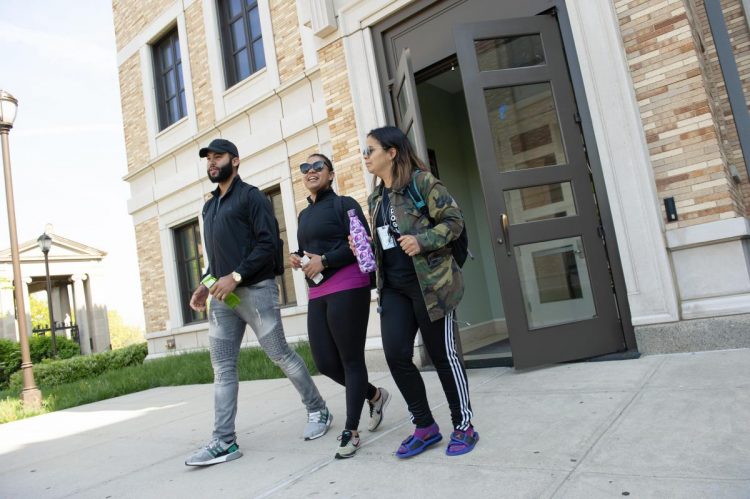The heating at Bronx Community College was restored to most of the campus Monday after not working for over a month.
Employees say heating and other infrastructure problems have been a perennial issue at the college and across the City University of New York system. Bronx Community College, founded in 1957, is the oldest community college campus in the system, and half of its 34 buildings are more than 80 years old, “with significant infrastructure and deferred maintenance issues,” according to the college’s most recent capital budget request.
Thomas Isekenegbe, president of the college, sent an email to staff members on Oct. 21 saying that an “orchestra of tradespeople” were working to get the heating system up and running and he expected campus boilers to be “fully operational” by the end of October, Gothamist reported. But the heat only started working again this week.
Yasmin Edwards, an associate professor of biological sciences at the college, said the campus generally takes time to switch over from cooling to heating and vice versa because of its aging boilers, and those intervening weeks can be uncomfortable. She didn’t know the boilers were in need of repairs this year until the Professional Staff Congress, a CUNY union for professors and staff members, started receiving complaints from employees about cold classrooms and offices. Edwards is the chair of the union chapter on campus.
She noted that the weather in New York City has been relatively mild this fall, but some mornings dipped into the 40s and could be felt in the older buildings on campus, which tend to get colder than others. Some professors, with student input, chose to hold class sessions online as a result.
Commercial buildings in New York City are required by law to provide heat from Oct. 1 to May 31 and must maintain an indoor temperature of at least 68 degrees if the outside temperature falls below 55.
A statement from the college said the heating issue is almost fully resolved.
“As of Monday, the heat on campus is operational with the exception of one building, which is expected to be operational [today].”
Edwards said her request to allow staff members to work remotely because of the cold was denied. She’s frustrated by what she views as a lack of urgency and transparency among Bronx Community College officials about needed maintenance and repairs on campus. She also said CUNY campuses, including BCC, aren’t adequately funded by the state, which she worries reflects an indifference toward the student body of the college.
The college disproportionately serves low-income students and students of color; 57 percent are Hispanic and 36 percent are Black, according to data from the college. The majority of students, 72 percent, receive financial aid, and 40 percent have annual household incomes below $15,000.
“Our community college is in one of the poorest congressional districts in the country,” Edwards said. “Our students are quite often immigrants and the children of immigrants. For our students, us as faculty and staff, we are their advocates … The decisions, the willingness to just give these students the least, always, it breaks my heart.”
The campus has a history of maintenance problems. The college’s capital budget request for fiscal year 2023 describes “deteriorated” roofs in need of replacing, “antiquated” fire alarm systems and other infrastructure issues in campus buildings. It also details how the heating system in a main classroom building, Colston Hall, failed in spring 2019, and the building “filled with ice and water” as a result, necessitating the relocation of 43 classrooms and 95 offices for six weeks.
Bronx Community College isn’t alone. Other CUNY campuses have also had maintenance problems. .
“CUNY colleges have had to defer routine maintenance for years because of fiscal pressures,” system officials noted in the system’s fiscal year 2023 budget request. “The result is facility deterioration in the near term and significantly increased facility operating and routine maintenance expenses.”
Susan Fountain, a coordinator for the PSC environmental health and safety committee, blames the New York State Legislature for underinvesting in the CUNY system over the years.
“Some of our campuses have older buildings, 50 years old, 80 years old, and because of the underfunding, a lot of maintenance has been deferred,” she said. “And we are seeing the effects of that, particularly at Bronx Community College. Every budget cycle we’re advocating for increased funding to CUNY, and at least some of that needs to go to really basic infrastructure issues that are profoundly affecting our members, such as no heat in the buildings where they work.”
CUNY requested $1.247 billion from the state last year for repairs, upgrades and expansions but only received $965.8 million.
Joseph Tirella, a spokesperson for the CUNY system, said in a statement that “CUNY and its colleges continuously conduct infrastructure repairs as needed.” He also noted that state lawmakers have recently dedicated a significant amount of funding toward those efforts.
“This year’s state budget provides nearly $1 billion in new capital funding for our system, a historic investment that includes $344 million for critical maintenance and $538 million for existing or new facilities at our senior colleges, and $45 million for our community colleges,” he said.
Fountain said she’s seen all kinds of maintenance problems on CUNY campuses, including leaks and mold. Particularly troubling to her is how often she hears about campus buildings with old or nonexistent HVAC systems.
“Good ventilation is essential to preventing the spread of COVID, lowering the risk of transmission,” she said. “With those aging ventilation systems, or no ventilation systems at all, our members and our students have increased risk for COVID.”
She noted that basic infrastructure problems are a distraction for students and faculty members and a particular burden on staff members who spend the most time in campus offices.
Michael Fischer, director of research at EAB, an education consulting firm, said there are “very, very few” colleges and universities that don’t have deferred maintenance issues.
“The maintenance backlog nationally has been growing significantly over the last couple of decades,” he said.
He believes these delayed infrastructure upgrades accumulate in part because campuses have expanded over time and are responsible for more upkeep, both on newer buildings and older buildings that “have long exceeded their expected life span” but are expensive to replace. But mostly he sees the problem stemming from a lack of resources.
“If anything is to blame, it’s the erratic funding nature and frequent cuts to university funding that institutions have experienced the last couple of decades, alongside rising costs,” he said.
He noted that some colleges and universities are especially struggling to make upgrades and fixes now because of supply chain issues, which means “it may take two or three times as long for a boiler or an air unit to arrive on campus than two or three years ago.” Meanwhile, inflation has made materials for maintenance projects more costly, and labor shortages mean technicians are stretched thin and must make judgment calls about what’s the most essential to fix.
“Things will slip through the cracks and lead to situations like the one you see here,” he said.
Edwards, the union head at Bronx Community College, agreed that the heating problems are indicative of a larger problem.
“The heat is a side effect of the lack of investment in infrastructure across CUNY as a whole,” she said. And “if you continue to defer maintenance over time, it means the cost of repairs get larger, and then it’s an even more challenging decision to commit even greater resources to do the necessary repairs. It’s kind of scary to think what will happen if we continue on this path.”
Source by www.insidehighered.com










